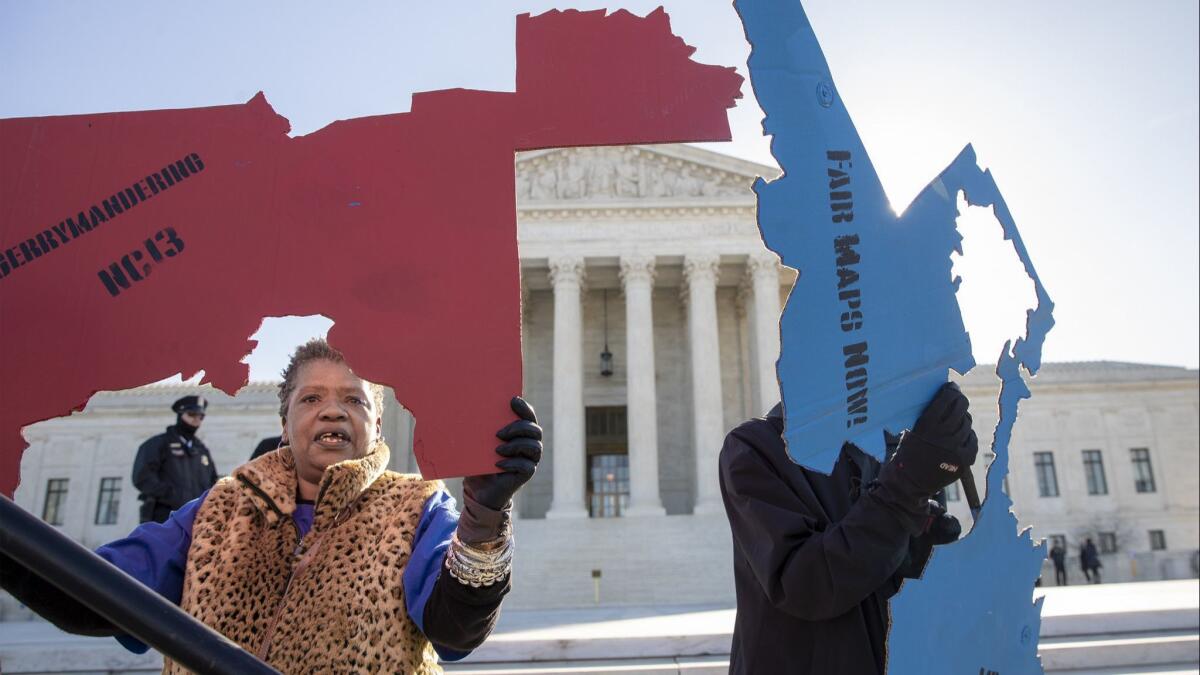Editorial: Gerrymandering distorts democracy. The Supreme Court should end it

- Share via
During oral arguments at the Supreme Court on Tuesday, Justice Brett M. Kavanaugh conceded that “extreme partisan gerrymandering is a real problem for our democracy.”
That was a huge understatement. When legislators manipulate congressional or legislative district lines to favor one party over another — a time-dishonored practice that has become more sophisticated in the computer age — the party in control can effectively nullify the votes of tens of thousands of citizens. With the decennial redistricting process set to begin again in only a couple of years, it’s time that the court held that partisan gerrymandering is not just routine political gamesmanship — but a cynical subversion of democracy and a violation of the U.S. Constitution.
The two cases argued on Tuesday demonstrate that gerrymandering is undertaken with a similar fervor by both major political parties. One of the cases involved a congressional map in North Carolina that Republicans admitted was designed to give their party the maximum advantage. The other case came from Maryland, where dominant Democrats designed a congressional map that moved more than 300,000 people in order to capture a seat long held by a Republican.
Enter the Fray: First takes on the news of the minute »
In 1986, the Supreme Court said that partisan gerrymandering could be challenged as unconstitutional under the 14th Amendment if it involved “intentional discrimination against an identifiable political group and an actual discriminatory effect on that group.” More recently, Justice Anthony Kennedy before he retired suggested that extreme gerrymanders might also violate the 1st Amendment because they penalize some voters for their political views and associations.
Yet the court has struggled to identify a standard for deciding when a gerrymander violates the Constitution, and some justices have urged that the court stop trying. On Tuesday, Justice Samuel A. Alito Jr. worried that a multiplicity of redistricting issues “are going to potentially end up in court” if the justices ruled for the challengers. But Justice Elena Kagan said that if the court were to rule that extreme gerrymandering were unconstitutional, “presumably, some actors would change their behavior.” If they didn’t, then, yes, the court would have to step in — just as it has done with redistricting plans that discriminate against racial minorities.
Alito and Justice Neil M. Gorsuch also wondered if the challengers in the North Carolina case were demanding that districts be drawn with some form of proportional representation — so that the makeup of a congressional delegation would mirror the number of votes cast statewide for each party.
That would be a difficult standard to impose because it could conflict with other redistricting principles, such as ensuring that congressional districts are compact and don’t split municipalities. But as Kagan noted, it’s possible to draw maps that eliminate unfair partisan advantage without requiring proportional representation.
Finally, Gorsuch and Kavanaugh raised the question of whether the court needed to act at all, given that several states have moved on their own to combat gerrymandering, such as by entrusting congressional redistricting to an independent, nonpartisan citizens commission as California has done. Those developments are welcome, but they don’t provide a nationwide solution grounded in the Constitution. The court must stop its agonizing and provide one.
Follow the Opinion section on Twitter @latimesopinion and Facebook
More to Read
A cure for the common opinion
Get thought-provoking perspectives with our weekly newsletter.
You may occasionally receive promotional content from the Los Angeles Times.









